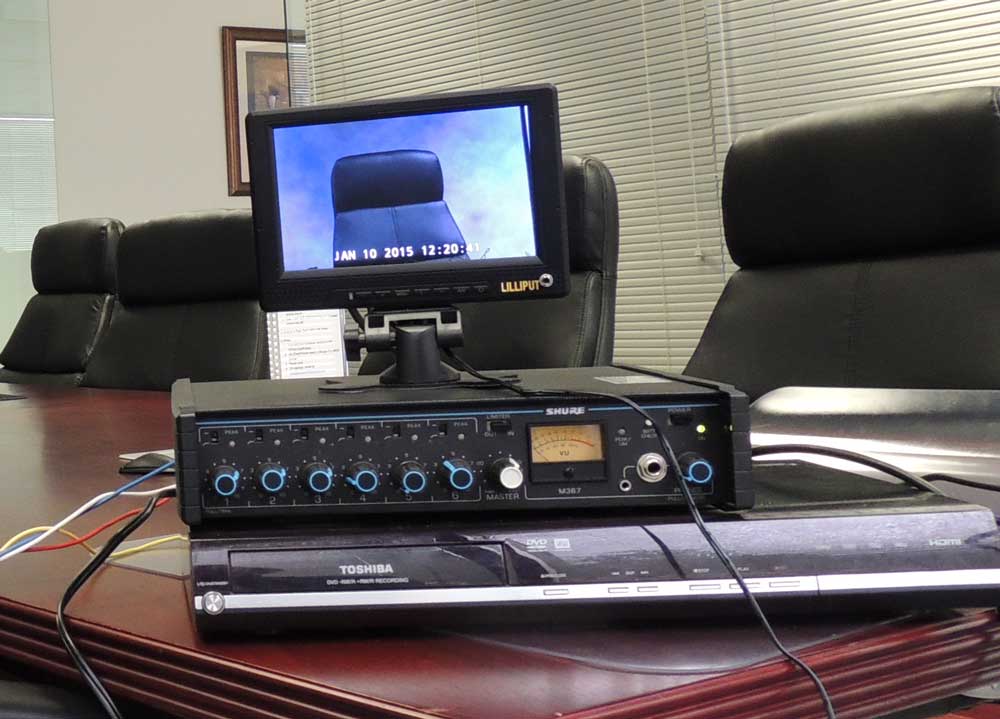Can legal video depositions replace live courtroom testimony?
The Significance of Lawful Video Depositions in Modern Legal Services: What You Need to Know
Lawful video depositions have become essential in today's lawful landscape. They supply a multidimensional view of witness testimonies that conventional records just can not match. By capturing both verbal and non-verbal interaction, these depositions improve the total understanding of a witness's reputation. However, the efficiency of video depositions depends upon different factors, including compliance with lawful requirements and best techniques (legal video depositions). Exploring these components discloses their real value in modern-day legal solutions
What Are Legal Video Clip Depositions?
Lawful video depositions offer as an important tool in the litigation procedure. They involve taping witness testimonies in a video style, recording both non-verbal and verbal interaction. This method permits attorneys to document the temperament, expressions, and reactions of witnesses, giving a richer context for the testimony. Usually carried out in a regulated environment, these depositions are led by attorneys who ask concerns while a court press reporter records the dialogue. The resulting video can be crucial for trial preparation, as it enables attorneys to examine the credibility of witnesses and refine their techniques. Furthermore, legal video depositions can be used in different legal contexts, ranging from civil disagreements to criminal situations. The acoustic and aesthetic components of video clip depositions boost the discussion of proof, making it a crucial part in the modern-day lawful landscape. In general, they contribute considerably to the efficiency and effectiveness of legal process.

Advantages of Video Depositions Over Standard Techniques
Video depositions offer numerous advantages contrasted to typical approaches of taking witness testaments. One substantial advantage is the capability to catch both visual and audio components, giving a much more thorough document of the witness's declarations. This dual layout boosts clearness and allows attorneys to reference particular nuances throughout test preparation. In addition, video clip depositions assist in remote involvement, making it simpler for witnesses who might be inaccessible for in-person looks because of geographical constraints or wellness issues.Moreover, video depositions can expedite the total deposition process, lowering the time and prices connected with travel and logistics. They likewise enhance access, as taped depositions can be easily shared amongst legal groups and referenced at any moment. This ease adds to better instance monitoring and preparation. Overall, video clip depositions represent a modern-day, effective strategy to gathering witness testaments, lining up with the advancing requirements of the lawful profession.
The Function of Body Language and Tone in Testimonies

In lawful video depositions, body language and tone play essential roles in conveying a witness's reputation and trustworthiness. Nonverbal hints can give insights into a witness's emotion, influencing exactly how their testament is regarded. Understanding the effect of these components is essential for lawyers and jurors alike when reviewing the dependability of a testimony.
Nonverbal Interaction Insights
While verbal interaction is typically stressed in legal testaments, nonverbal signs such as body movement and tone play an important function in conveying trustworthiness and feeling. Onlookers of depositions may note that a witness's pose, motions, and facial expressions can considerably influence understandings of dependability. Consistent eye contact might indicate confidence, while staying clear of look might suggest dishonesty or pain. In a similar way, the intonation-- its pitch, quantity, and pace-- can pass on feelings of sincerity or uncertainty. Attorneys have to be attuned to these nonverbal signals, as they frequently provide essential context that matches spoken words. Recognizing these subtleties can boost the efficiency of depositions and influence the end result of legal process.
Emotional Tone Influence
The emotional tone conveyed during lawful statements greatly impacts exactly how a witness is perceived. Body movement, vocal inflections, and faces play crucial duties in forming the story of a testimony. A witness exhibiting self-confidence via constant eye contact and a tranquil tone can infuse a feeling of integrity and engagement. Alternatively, signs of anxiety, such as fidgeting or a shaky voice, may lead to apprehension regarding their account. The subtleties of emotional expression can influence the interpretation of facts, making it crucial for legal specialists to recognize these hints. In video clip depositions, the auditory and aesthetic parts combine, highlighting the value of psychological tone in conveying sincerity and reliability within the lawful procedure.
Trustworthiness and Reliability
A vital element in establishing reputation and credibility during statements that site depends on the witness's body movement and intonation. Viewers often rely upon non-verbal hints-- such as eye contact, position, and gestures-- to evaluate a witness's sincerity. A witness who maintains eye get in touch with and presents open body language might be regarded as even more sincere and trusted than one that avoids eye get in touch with or appears closed off. Additionally, intonation plays a crucial duty; a consistent, calm tone can reinforce the reliability of the testimony, while variations in pitch or quantity might elevate questions. Inevitably, the combination of body language and singing tone considerably affects how a witness's declarations are gotten and interpreted in a legal context.
Best Practices for Conducting Video Depositions
Conducting video clip depositions calls for cautious preparation and execution to ensure a clear and reliable discussion of testimony. It is crucial to choose a peaceful, well-lit place to minimize interruptions and safe optimal video top quality. The devices needs to be checked beforehand, consisting of electronic cameras, microphones, and lighting, to avoid technological concerns during the deposition.Next, parties included should evaluate the format and treatments beforehand, making sure that everyone comprehends their roles. The deponent should be oriented on the process, including exactly how to respond clearly and concisely.Additionally, maintaining a professional attitude throughout the session is essential. This includes avoiding talking over each other and validating that all concerns are routed suitably. It is important to videotape the deposition in a style that allows for easy playback and evaluation, protecting the integrity of the statement for future use.
Legal Factors To Consider and Compliance Issues
Exactly how do legal considerations and conformity problems affect the efficiency of video depositions? Lawful experts have to browse a complex landscape of guidelines, making certain that video clip depositions stick to administrative policies and criteria. Compliance with legislations concerning privacy, consent, and tape-recording techniques is vital. For example, acquiring explicit authorization from all celebrations included is needed to avoid legal repercussions.Additionally, the admissibility of video proof in court can rest on conformity with procedural demands. Making sure that the equipment utilized satisfies technological criteria is also vital, as bad high quality can undermine the deposition's reliability.Moreover, attorneys have to be conscious of any kind of certain state legislations that govern video depositions, as these can differ greatly. Failing to deal with these considerations can not just endanger the stability of the deposition yet additionally affect the overall instance approach, eventually impacting the client's legal results.
How Video Depositions Impact Court Understanding
While video depositions can function as powerful devices in lawful procedures, their influence on jury assumption is substantial. The aesthetic and acoustic components of video recordings provide jurors with an extra comprehensive understanding of witness temperament, reputation, and emotional feedbacks. This multimedia method can improve the jurors' ability to analyze the dependability of testament contrasted to typical text-based transcripts.Moreover, video depositions enable jurors to observe body movement, tone of voice, and faces, all of which can influence their analysis of the witness's statements. The visibility of a witness on display can humanize them, cultivating compassion and connection, which might sway jurors' viewpoints. On the other hand, a witness that appears incredibly elusive or unreliable on video clip might result in unfavorable assumptions that affect a court's decision. Ultimately, the dynamic nature of video depositions plays a vital duty in forming how jurors analyze proof and reach their verdicts.
The Future of Video Clip Depositions in Legal Practice
As improvements in modern technology proceed to improve the legal landscape, the future of video clip depositions is positioned for substantial development. Advancements such as expert system, digital fact, and improved video conferencing tools are expected to enhance the deposition process and boost accessibility. Legal specialists may use AI-driven analytics to examine witness integrity and instance toughness extra effectively.Moreover, the combination of online fact could enable courts to experience immersive simulations of depositions, providing much deeper context and understanding. Additionally, the trend towards remote depositions is likely to continue, supplying greater versatility for attorneys and clients alike.As remote job comes to be progressively stabilized, video depositions will likely come to be conventional practice, decreasing costs and time constraints related to traditional approaches. In general, these technical innovations guarantee to boost the effectiveness, efficiency, and access of video clip depositions in lawful method, inevitably transforming how lawyers prepare for test.
Regularly Asked Questions
How Much Do Lawful Video Clip Depositions Commonly Cost?

Can Video Clip Depositions Be Used in Any Type Of Kind Of Instance?
Video clip depositions can be made use of in different sorts of cases, consisting of civil, criminal, and family reference members law. Their adaptability permits attorneys to existing witness statements properly, adjusting to the specific needs of different lawful circumstances.
What Tools Is Needed for a Video Deposition?
To conduct a video deposition, necessary devices includes a premium video camera, microphone, lighting, news and a trustworthy recording tool. Additionally, a computer system with editing and enhancing software may be essential for post-production and formatting the final video clip.
Exactly how Lengthy Does a Normal Video Clip Deposition Last?
A regular video deposition lasts between two to four hours, depending upon the intricacy of the case and the variety of questions presented. Extensive sessions may take place, but breaks are generally incorporated for individual convenience.

Are Video Clip Depositions Admissible in Court?
Video clip depositions are typically admissible in court, given they comply with legal requirements and rules of evidence. Their use enhances quality and preserves witness testimony, aiding in the judicial process throughout hearings and tests. Legal video depositions have actually come to be important in today's lawful landscape. Furthermore, legal video clip depositions can be utilized in numerous legal contexts, ranging from civil disagreements to criminal cases. Additionally, video clip depositions help with remote engagement, making it much easier for witnesses who might be not available for in-person appearances due to geographical restrictions or wellness issues.Moreover, video depositions can quicken the general deposition process, reducing the time and prices associated with traveling and logistics. Ensuring that the equipment used fulfills technical standards is additionally vital, as inadequate quality can threaten the deposition's reliability.Moreover, lawyers must be aware of any certain state legislations that govern video depositions, as these can vary significantly. Furthermore, the trend towards remote depositions is likely to linger, using higher adaptability for attorneys and clients alike.As remote work comes to be increasingly normalized, video depositions will likely become conventional technique, lowering prices and time restraints linked with traditional approaches.